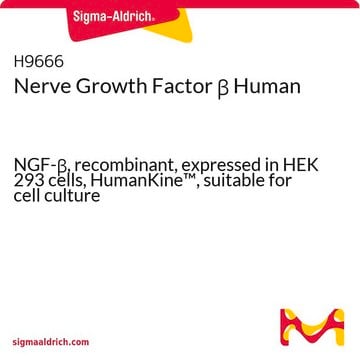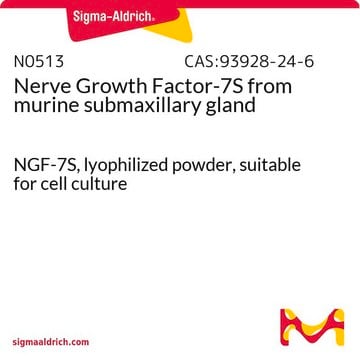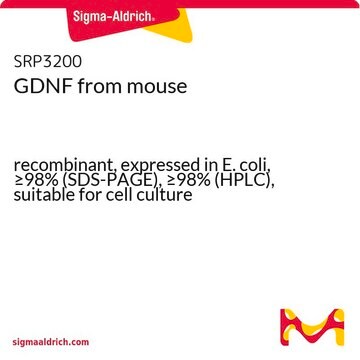N8133
Nerve Growth Factor from Vipera lebetina venom
NGF, lyophilized powder, suitable for cell culture
Iniciar sesiónpara Ver la Fijación de precios por contrato y de la organización
About This Item
Productos recomendados
biological source
Vipera Lebetina
Quality Level
form
lyophilized powder
potency
0.2-20 μg/mL ED50/EC50
quality
endotoxin tested
mol wt
protein 32.5 kDa
packaging
pkg of 0.1 mg
technique(s)
cell culture | mammalian: suitable
impurities
<10 EU/vial
color
white to off-white
UniProt accession no.
storage temp.
−20°C
Physical form
Lyophilized from a 0.2 μm filtered solution in sodium acetate buffer.
Preparation Note
Isolated from the snake venom of V. lebetina.
Analysis Note
The biological activity of Nerve Growth Factor (NGF) from Vipera lebetina venom is measured in a cell proliferation assay using PC-12 cells.
Storage Class
11 - Combustible Solids
wgk_germany
WGK 3
flash_point_f
Not applicable
flash_point_c
Not applicable
ppe
Eyeshields, Gloves, type N95 (US)
Certificados de análisis (COA)
Busque Certificados de análisis (COA) introduciendo el número de lote del producto. Los números de lote se encuentran en la etiqueta del producto después de las palabras «Lot» o «Batch»
¿Ya tiene este producto?
Encuentre la documentación para los productos que ha comprado recientemente en la Biblioteca de documentos.
Los clientes también vieron
Geraldine Longo et al.
The Journal of neuroscience : the official journal of the Society for Neuroscience, 33(24), 10066-10074 (2013-06-14)
Although chronic pain is the most common symptom of arthritis, relatively little is known about the mechanisms driving it. Recently, a sprouting of autonomic sympathetic fibers into the upper dermis of the skin, an area that is normally devoid of
Tao Yu et al.
The Journal of neuroscience : the official journal of the Society for Neuroscience, 34(17), 6098-6106 (2014-04-25)
Trk neurotrophin receptor ubiquitination in response to ligand activation regulates signaling, trafficking, and degradation of the receptors. However, the in vivo consequences of Trk ubiquitination remain to be addressed. We have developed a mouse model with a mutation in the
Jeremy E Purvis et al.
Cell, 152(5), 945-956 (2013-03-05)
A growing number of studies are revealing that cells can send and receive information by controlling the temporal behavior (dynamics) of their signaling molecules. In this Review, we discuss what is known about the dynamics of various signaling networks and
M Florencia Iulita et al.
Trends in pharmacological sciences, 35(7), 338-348 (2014-06-26)
Alzheimer's disease (AD) is a devastating neurodegenerative condition and the most common type of amnestic dementia in the elderly. Individuals with Down syndrome (DS) are at increased risk of developing AD in adulthood as a result of chromosome 21 trisomy
Rachel T Uren et al.
Journal of neurochemistry, 129(4), 614-627 (2014-02-04)
Suppressor of cytokine signaling-2 (SOCS2) is a regulator of intracellular responses to growth factors and cytokines. Cultured dorsal root ganglia neurons from neonatal mice with increased or decreased SOCS2 expression were examined for altered responsiveness to nerve growth factor (NGF).
Nuestro equipo de científicos tiene experiencia en todas las áreas de investigación: Ciencias de la vida, Ciencia de los materiales, Síntesis química, Cromatografía, Analítica y muchas otras.
Póngase en contacto con el Servicio técnico









